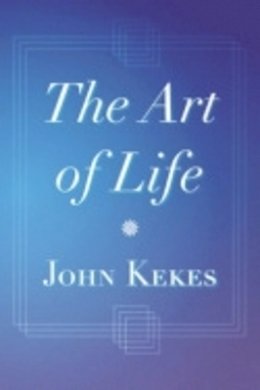

"That the art of life is creative, imaginative, and individual does not mean... that it cannot be taught and learned or that individuals cannot improve their mastery of it. Teaching it proceeds by way of exemplary lives, and learning it consists in coming to appreciate what makes some lives exemplary.... That imitation here is impossible does not mean one cannot learn from examples. The question is, How can that be done reasonably; how can decisions about how one should live escape being arbitrary, if they are left to individual creativity and imagination and are not governed by rules that apply to everyone living in a particular context?"—from The Art of LifeThe art of life, according to John Kekes, consists in living a life of personal and moral excellence. This art requires continuous creative effort, drawing on one's character, circumstances, experiences, and ideals. Since these conditions vary with times and places, Kekes says, there can be no single blueprint for the achievement of excellence. We must do it ourselves—but we can learn from those who have lived exemplary lives.Reflecting on lives of integrity and honor, Kekes formulates what we can learn from them and what we can do to adapt the ideals they represent to our personal circumstances. Avoiding both the abstractness that characterizes much moral thought and the relativism that recognizes no rational or moral limits, Kekes shows how serious philosophical thinking can be readable and helpful to those who struggle with the perennial problems of human existence.
Product Details
About John Kekes
Reviews for The Art of Life
The Journal of Ethics
Kekes belongs to a flourishing school of thought known as 'virtue ethics.' He and his colleagues believe that mainstream moral philosophers since the time of Kant and Bentham have been barking up the wrong tree. Instead of seeking to define morality in terms of abstract universal principles, they should have stuck to the traditional methods of Aristotle and Cicero, exploring what it might mean for particular individuals to have a virtuous or vicious character, or to lead an honourable or a despicable life. The Art of Life is an impressive attempt to tackle this task directly.
Times Literary Supplement
Arguing that no formalist doctrine such as Kant's can provide universally valid rules for leading a moral life, Kekes instead maintains that the study of admirable individuals furnishes the guidelines we need. Among those Kekes finds worthy of emulation are Montaigne and Thomas More, who balanced public responsibilities with private commitments.... Highly recommended for all public libraries.
Library Journal
